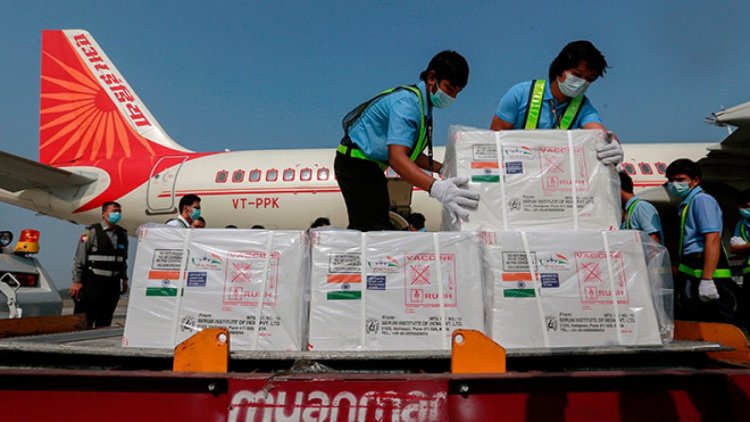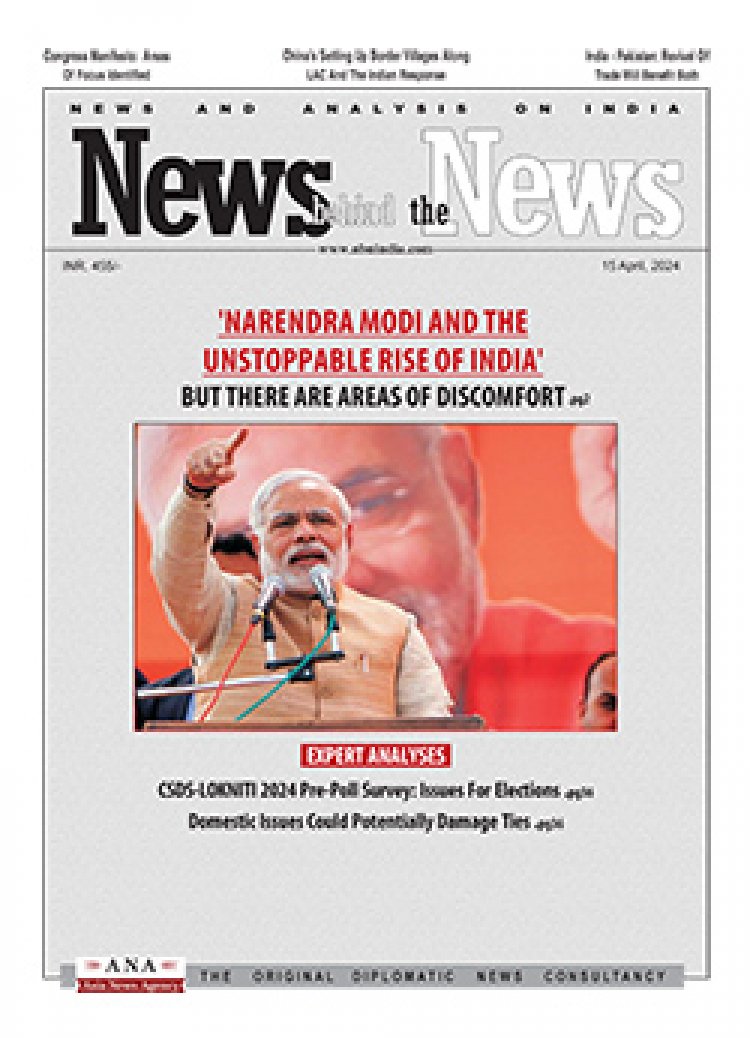Raisina Dialogue: Focus on Vaccine Diplomacy and China
STORIES, ANALYSES, EXPERT VIEWS

Prime Minister Narendra Modi inaugurated the sixth edition of the Raisina Dialogue, India’s premier conference on geopolitics and geoeconomics, on April 13. It is being held virtually this year due to the coronavirus pandemic and is being hosted by the Observer Research Foundation in partnership with the ministry of external affairs.
Vaccine diplomacy
Participating in a session at the Raisina Dialogue that focused on vaccines and global expectations, external affairs minister S Jaishankar Tuesday held up India’s ability to manufacture a range of Covid-19 vaccines as an example of global cooperation and said this couldn’t be seen as a “one-way street”.
“Equitable access [to vaccines] is critically important in this [fight against the pandemic], because we all know that no one will be safe till everyone is safe,” he said during the virtual session moderated by Bill and Melinda Gates Foundation CEO Mark Suzman.
There is a need for additional production capabilities for vaccines, and without it, “distributive justice by itself will not be adequate”, he added……Doing good is also doing smart,” he said.
Noting that India’s ability to make vaccines is a result of international cooperation, he added: “International cooperation is not a one-way street where we are giving things to other people and somewhere short-changing ourselves.”
So far, India has provided 65.1 million doses of Covid-19 vaccines to 90 countries, including 10.6 million doses supplied as grants. India’s deliveries of vaccines to other countries followed on from its work in providing humanitarian aid to numerous countries after natural disasters and its actions to address climate crisis, Jaishankar said.
Covid-19 crisis has global dimensions - Foreign secretary: Speaking later on Wednesday, Foreign secretary Harsh Vardhan Shringla said “The Covid crisis has global dimensions, so cooperation is widely needed. The Saarc Summit initiated by PM Modi was a great example of regional cooperation, even if they did not meet eye to eye on political issues,” Shringla said while commenting on the impact of plurilateralism on global cooperation.
Shringla made these comments at a session, ‘Plurilateralism Inc: The future of global governance’, at the ongoing Raisina Dialogue 2021 to a panel which had former Prime Minister of Sweden Carl Bildt and OECD Sherpa to the G20 and G7 summits Nicolaus Pinaud.
Mentioning the Quad vaccine collaboration initiative, Shringla said, “More recently, the first Quad Summit announced a vaccine initiative, whereby vaccines manufactured in India, financed by the United States and Japan, would be supplied across the Indo-Pacific with Australian last-mile logistical support.”
“The Quad, too, came up with a vaccine diplomacy initiative. India is a part of multiple groupings, including plurilateral, trilateral and so on. The aim is to use these to the maximum effect. As far as we are concerned, we would like to work in close cooperation with all,” said Shringla.
Need for reformed multilateralism: The foreign secretary also said that there is a need for reformed multilateralism and India’s multilateralism gives a voice to more countries. “India has come up with reformed multilateralism, granting a voice to more countries. It is not a rigid system where the status quo persists. Countries form effective mechanisms to find solutions to global problems and issues,” Shringla said.
“There is a need for reformed multilateralism. Where it is convenient for India to engage, we will engage, be it in the multilateral or plurilateral format,” he further added.
China focus in the Raisina Dialogue
Speaking at the Raisina Dialogue, chief of defence staff General Rawat said China feels “it has arrived” on the world stage because of its “superior” armed forces, equipped with “advanced and disruptive technologies” that can paralyze an adversary’s strategic systems as well as energy, banking, transport and communication grids.
“They (Chinese) feel that by doing a little bit of shove-and-push, they will be able to compel nations to give into their demands. But I think India has stood firm on its northern borders and we have proven that we will not get pushed,” said the CDS.
The international community has come to India’s support by affirming that every country must follow the international rules-based order, without seeking to unilaterally alter the status quo.
“China tried to change the status quo by the use of disruptive technologies without using force...They thought that India, as a nation, will succumb to the pressures that they have been putting on us because of the technological advantage that they have. But that did not happen,” said the CDS.
Japan, Australia also slams China: Chief of staff of the Japanese Self Defence Forces General Koji Yamazaki also slammed China’s attempts to unilaterally change the status quo in areas like the Taiwan Strait as well as the East and South China Seas. China does not recognize the legitimate interests of Japan and other countries in the region and such an approach will heighten tensions and directly affect the stability of not just these areas but the entire Indo-Pacific region, he said.
Australian chief of defence forces General Angus Campbell, in turn, said, “(China’s) Grey zone tactics are a way to nibble away at territory. We see this in the South China Sea. It is very challenging to respond without breaching the line that leads to open conflict.”
Chinese interests in the Indian Ocean Region (IOR)
Earlier, Indian Navy chief Admiral Karambir Singh Wednesday said it was hardly surprising that China’s navy was coming and operating in the strategic Indian Ocean Region (IOR) as Beijing’s energy sources, markets and resources are located to the west.
“As they say, flag follows trade,” Singh said during a discussion on challenges in the Indo-Pacific region at the Raisina Dialogue.
“China’s navy has the wherewithal and intent, and I envisage a continued focus on their growth in the near future. They want to replicate US Navy carrier battle groups but developing carrier air wing will take time,” Singh said, responding to a question on China deploying aircraft carriers. China currently operates two aircraft carriers --- CV-16 Liaoning and CV-17 Shandong. It is building a third carrier.
India, writes According to Rahul Singh (has covered defence and military affairs at the Hindustan Times for over a decade), “is keeping tabs on China’s aggressive moves in the South China Sea and taking steps to ensure that the Chinese navy doesn’t muscle its way into the Indian Ocean where combat-ready Indian warships are carrying out round-the-clock surveillance for any unusual activity.”
The Chinese are undoubtedly in the IOR already, said maritime affairs expert Rear Admiral Sudarshan Shrikhande (retd). “They have come here (IOR) to stay, play and have a say. Through sustained and overlapping deployments, potentially more bases and partners; China’s multi- dimensional military power with sea power in the lead is something to think about carefully.”
Aggressive Chinese naval actions and asymmetric activities undermine the rules- based order and constitute a major challenge, Admiral Phil Davidson, commander of the US Indo-Pacific Command said. “The Indo-Pacific region is in competition between a closed and authoritarian Beijing vision and the idea of a free and open Indo-Pacific.”
From carrying out naval drills with like-minded countries to reaching out to states in the IOR, Rahul Singh says “the Indian Navy is focusing on checking China’s rising ambitions in the region and sending out a strong message that Beijing’s power play in South China Sea cannot be replicated in the Indian Ocean.
“The navies of India and the US recently concluded multilateral drills in the eastern IOR. France along with the Quad navies of India, the US, Japan and Australia carried out complex maritime drills to enhance interoperability among their navies from April 5 to April 7.”
Importance of Quad cooperation
In this context, Admiral Karambir Singh, significantly acknowledged that most threats in the maritime domain were transnational and it was not possible for any nation to go solo. The Admiral stated that the navies of the Quad countries — India, Australia, Japan and the US — had the capability and capacity to come together almost in a ‘plug and play’ manner. This assertion, writes The Tribune reaffirms the growing clout of the Quad, which held its first summit-level talks last month. The four-nation alliance is perceived to be a countervailing force against China’s rampant muscle-flexing in the Indo-Pacific region, though its members insist that there are several areas of convergence — right from vaccine collaboration, climate action, maritime security and emerging technologies to counter-terrorism.
“In an impressive show of strength and synergy, the Quad navies had carried out the Malabar exercise in the Bay of Bengal and the Arabian Sea in November last year. The four nations have repeatedly pledged to ensure an open and inclusive Indo-Pacific and a rules-based international order. While China has every reason to be wary of the grouping, India’s old ally Russia is far from enthused by it, with Foreign Minister Sergey Lavrov referring to it as an ‘Asian NATO’ with apparently militaristic designs.”
















